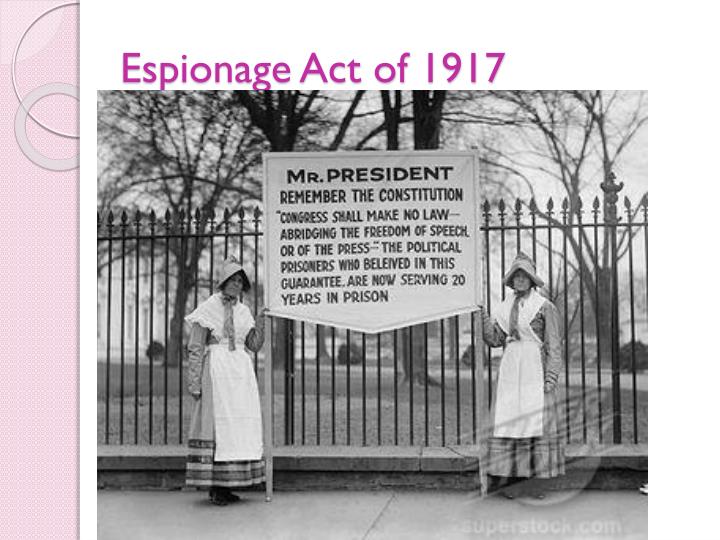

The Espionage Act, introduced on June 5, 1917, made punishable any acts aimed at obstructing military operations or enlistment to the armed services. Supreme Court ruling meant there were limits to freedom of speech in war time. The Sedition Act of 1917 limited freedom of speech. He proposed the introduction of two bills, the Espionage and Sedition acts, which enabled his department to take legal action against dissidents. Under normal circumstances, his actions would have been protected by 1st amendment The country was at war, Schenck's freedom of speech was not protected. Schenck took his case to the United States Supreme Court arguing that his constitutional right to freedom of speech had been violated He was arrested and convicted for violating the Espionage and Sedition Act of 1917. WWI Charles Schenck, a member of the Socialist Party, handed out leaflets condemning the war and urging young men to resist the military draft. Postmaster General Albert Burleson used the Espionage Act to ban from the mail those magazines and newspapers he perceived as promoting discord against the. In 1917 the United States was at War with Germany. The leader of the Committee on Public Information was journalist George Creel used modern public relations techniques to promote the war effort, at home and abroad. The CPI became the US government’s propaganda and publicity agency. The purpose of the Committee on Public Information was to provide members of the public with information about the war effort and the censorship of anti-war material.

The Committee on Public Information (CPI), aka the Creel Committee, was also tasked with censorship of potentially damaging material. President Woodrow Wilson considered that public support was to the entire wartime effort. The CPI provided propaganda during WW1 to rally the support of American citizens for all aspects of the war effort. The Committee on Public Information (CPI), was established on Apand headed by Journalist George Creel. Congress and President Wilson enacted this law to promote patriotism, nationalism and protect the National Security of the US during WWI At least 1,597 persons were arrested, and 41 received prison sentences newspapers criticizing the government lost mailing privileges.

Provided for up to $10,000 in fines and 20 years in prison for interfering with the war effort or using disloyal language. Fines of up to $10,000 and/or up to 20 years in prison.ģ Sedition Act – 1918 It was a crime to speak against the purchase of war bonds or willfully utter, print, write or publish any disloyal, profane, scurrilous, or abusive language about this form of US Govt., The US Constitution, or the US armed forces or to willfully urge, incite, or advocate any curtailment of production of things necessary or essential to the prosecution of the war…with intent of such curtailment to cripple or hinder, the US in the prosecution of the war. Ordered the Postmaster General to remove Leftist materials from the mail. Even as President Woodrow Wilson justified US. Presentation on theme: "Espionage and Sedition Acts"- Presentation transcript:Ģ Espionage Act – 1917 It forbade actions that obstructed recruitment or efforts to promote insubordination in the military. The Espionage and Sedition Acts of 1917-1918 mark one of the most controversial moments in American history.


 0 kommentar(er)
0 kommentar(er)
